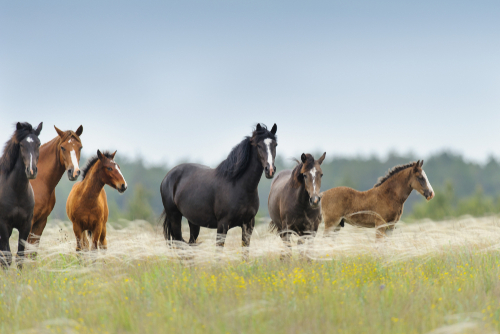MRes - Determining the involvement of novel genes in bone fracture risk in Thoroughbred horses
Supervisors: Dr Debbie Guest and Dr Esther Palomino Lago
Department: Clinical Science and Services
Project Details

Fractures caused by bone overloading (as opposed to a direct trauma) often occur in racing Thoroughbreds and are the most common reason for a horse to be euthanised on the racecourse. The risk of fracture is affected by both environmental and genetic factors.
We have previously applied the use of a genome-wide polygenic risk score to establish an in vitro cell system to study bone gene regulation. This model identified a number of genes which are differentially expressed in bone-forming cells derived from horses at genetically high and low risk of fracture. A proportion of these genes have a known role in bone formation or fracture, but a proportion of the genes have no published role in bone.
We have an exciting opportunity for a full time MRes project in our group to determine the role of some of these candidate genes in bone differentiation.
This project will use cutting edge cell culture methods to determine gene function and will involve training in a wide range of molecular biology techniques.
References
-
Baird A, Lindsay T, Everett A, Iyemere V, Paterson YZ, McClellan A, et al. Osteoblast differentiation of equine induced pluripotent stem cells. Biology Open. 2018;7(5):bio033514. doi: 10.1242/bio.033514.
-
Blott SC, Swinburne JE, Sibbons C, Fox-Clipsham LY, Helwegen M, Hillyer L, et al. A genome-wide association study demonstrates significant genetic variation for fracture risk in Thoroughbred racehorses. BMC genomics. 2014;15(1):147. Epub 2014/02/25. doi: 10.1186/1471-2164-15-147.
-
Welsh CE, Lewis TW, Blott SC, Mellor DJ, Stirk AJ, Parkin TD. Estimates of genetic parameters of distal limb fracture and superficial digital flexor tendon injury in UK Thoroughbred racehorses. Vet J. 2014. Epub 2014/04/01. doi: 10.1016/j.tvjl.2014.03.005. PubMed PMID: 24679457.
Requirements
Essential:
- Must meet our standard MRes entry requirements.
-
A degree in biological sciences or related subject.
Desirable:
- Previous laboratory experience including cell culture and/or molecular biology would be beneficial but is not essential.
This project will be full-time (12 months) commencing in October 2023. It will be based at RVC's Hawkshead campus.
Funding
This project is partially funded: e.g. the lab will be covering the project costs, with the MRes student expected to meet the course fees and their living expenses.
You can find information on fees and funding online. A postgraduate master's loan may be available to help cover costs.
How to Apply
For more information on the application process and English Language requirements see How to Apply.
Deadline: 30th July 2023
We welcome informal enquiries - these should be directed to djguest@rvc.ac.uk
Interview date and location: TBC (August 2023)
